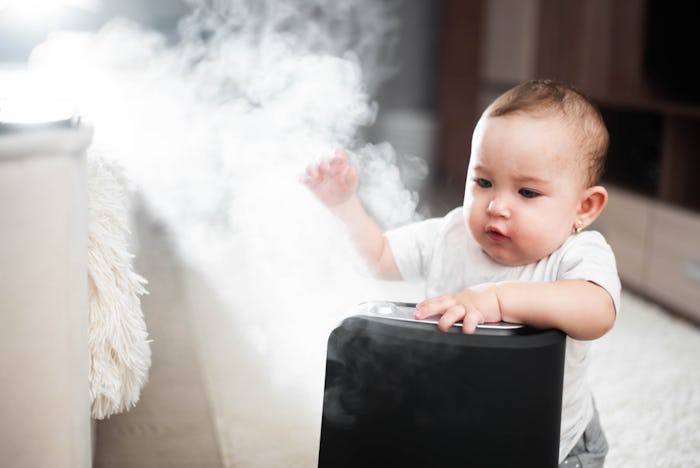Life
What You Need To Know Before Using Essential Oils In Your Baby's Humidifier
As people seek alternatives to doctor's offices and prescriptions, essential oils have risen to the top of the popularity pyramid when it comes to holistic solutions for common health problems. That's especially true during cold and flu season, when some people swear that adding essential oils to a humidifier is a great way to help clear stuffy little noses (big ones, too), or even soothe infants to sleep at night. But is it safe to put essential oils in a baby's humidifier?
There are multiple factors which determine whether a particular oil is safe for children under the age of three, according to the National Association of Holistic Aromatherapy. Because of young children's increased sensitivity to the potency of substances, an oil's dilution ratio, quality, and application method all factor into whether a particular potion is safe for an infant (or anyone, really). Still, with 100 percent evaporation in a vaporizer or humidifier, the concentration of any oil is unlikely to reach a dangerous level.
In an email to Romper, Dr. Jennifer Shu, medical editor of the AAP's online publication HealthyChildren.Org, wrote, “Any vaporized substance can cause irritation to the eyes, nose, mouth/throat and lungs. Infants and young children may be particularly sensitive to vaporized oils or particles because they breathe more times per minute than adults and have less mature lungs. I also caution parents that scents that they find appealing may not be as well tolerated by their children (I hate lavender for example but I know a lot of people find it soothing)."
It's important to remember that herbal remedies like essential oils are not regulated by the FDA. Additionally, the American Association of Pediatrics recommends looking out for red flags such as inconsistent nomenclature, varied concentrations of active ingredients, and harvesting conditions when exploring the items' safety.
"For example, 'cohosh' can refer to several species of plants depending on geographic location. There is no governmental regulation on the manufacture, purity, concentration, or labeling claims of herbal remedies and dietary supplements. Thus, it is always 'buyer beware' in this marketplace," writes Dr. Allen D. Woolf in the organization's AAP News. "When compared with adults, children may be particularly susceptible to the effects of such dosage variations by virtue of their smaller size and different capacity for detoxifying chemicals."
The skin of infants and toddlers is much thinner than that of adults and topical application should be avoided until at least the age of two, according to the Herbal Academy of New England. That being said, inhalation is a safer way for children under six to take advantage of essential oils' beneficial qualities, the organization says on its website. Respiratory infections will particularly benefit from the inhalation of pine, cypress, spruce or fir, while vaporizing lavender, neroli, bergamot, geranium and sweet orange (or a combination thereof) in a diffuser is an effective way to help children relax at bedtime.
On the academy's list of taboo oils for children's inhalation are popular selections like anise, eucalyptus, rosemary, fennel and wintergreen. Naturopathic pediatrician Erika Krumbeck agrees that vaporizing essential oils is a safe method of application for little ones, but parents should resist the temptation if anyone in the house suffers from a chronic respiratory condition like asthma. Essential oils will not help those cases and could actually exacerbate the problem.
"Most essential oils will inflame a sensitive respiratory tract," she wrote for Naturopathic Pediatrics. "I have heard from some of my naturopathic colleagues who have seen frightening cases of children completely unable to breathe because of essential oil-induced asthma attacks."
By following some basic guidelines and being very, very clear about which oils are a no-go for children, a few drops in a humidifier to help kids relax or breathe easily should be fine. Just remember to err on the side of caution when it comes to concentrations and forgo an application if you have any doubt about the safety of a particular oil.
